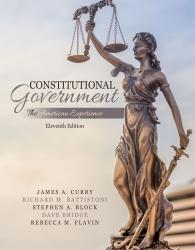Constitutional Government: The American Experience
Author(s): James Curry , Richard Battistoni , Stephen Block , David Bridge , Rebecca Flavin
Edition: 11
Copyright: 2020
Pages: 567
Choose Your Platform | Help Me Choose
- Provides a shared emphasis on history, politics, and law in relation to the growth and development of the United States Constitution.
- Examines the major controversies over constitutional interpretation throughout the nation's history.
- Introduces well-known historical figures within every chapter, more or less text is in their own words.
- Incudes case index, it provides readers with a better understanding of cases discussed within the text.
- Provides a web-based component that is designed to assist both teachers and students.
- Features additional authors in the new 10th edition.
Part 1
The Constitutional Text and Context
1. The Principles and Origins of American Constitutionalism
Brief 1.1 The Legacy of the Universal Declaration of Human Rights
Brief 1.2 Constitution Writing over Time
Brief 1.3 Keeping the Spread of Democracy in Perspective
Brief 1.4 The “Unwritten” British Constitution
Brief 1.5 Contemporary Liberals and Conservatives
Brief 1.6 Sir Edward Coke’s Legacy
Brief 1.7 The English Bill of Rights
2. American Constitutionalism: The Founding Generation
Brief 2.1 The Northwest Ordinance: A Legacy of the Articles of Confederation
Brief 2.2 Roll Call at the Constitutional Convention
Brief 2.3 The Difficult Struggle over Ratification
Brief 2.4 Historical Critiques of the U.S. Constitution
Part 2
Structures and Processeses of American Constitutional Government
3. The Nature and Scope of Judicial Power
Brief 3.1 The Men and Women of October
Brief 3.2 Clerking at the Supreme Court
Brief 3.3 Two Historic Battles over Supreme Court Confirmation
Brief 3.4 The Death of Justice Scalia and the Battle over His Replacement
Brief 3.5 The Contentious Confirmation Process: From Clinton to Obama
Brief 3.6 Judicial Appointments . . . and Disappointments:
Brief 3.7 President Obama’s First Two Supreme Court Appointees:
Brief 3.8 The Seventeenth Chief Justice: John G. Roberts
4. The Origins and Practices of Judicial Review in the American System
Brief 4.1 Competing Visions of the Judicial Role
Brief 4.2 The Supreme Court Revolution of 1937
Brief 4.3 A Classic Confrontation: Marbury v. Madison (1803)
Brief 4.4 Bush v. Gore: One for the Textbooks
5. Separation of Powers and The American Presidency
Brief 5.1 Constitutional Amendments and the Presidency
Brief 5.2 The President’s Constitutional Powers: Article II
Brief 5.3 The Politics of Presidential Vetoes
Brief 5.4 The Rise and Fall of the Line-Item Veto
Brief 5.5 The Executive Branch of Government
Brief 5.6 The Controversy over “Recess” Appointments
Brief 5.7 Pardon Me?: Some Controversial Pardons
Brief 5.8 A Nation Struggles with Its Conscience
Brief 5.9 The War Powers Resolution
Brief 5.10 Presidential War Power and the Persian Gulf Conflict
Brief 5.11 The USA PATRIOT Act of 2001
Brief 5.12 The Development of Drone Warfare
Brief 5.13 What Is Guantanamo Bay?
Brief 5.14 The Military Commissions Act of 2006
6. Separation of Powers and Congress
Brief 6.1 The Filibuster: Protecting Minority Rights or Wasting Time?
Brief 6.2 Congressional Attacks on the Supreme Court
Brief 6.3 What Was Watergate?
Brief 6.4 The Starr Report and the Clinton Impeachment
Brief 6.5 The Rise of Government Corporations
7. Federalism: The Interaction of National and State Governments
Brief 7.1 Horizontal Federalism: Legacy of the Articles of Confederation
Brief 7.2 States’ Rights and the Small Republic Argument
Brief 7.3 Jeffersonians as Nationalists, Federalists as States’-Righters
Brief 7.4 States, Territories, and Federalism
Brief 7.5 The Webster–Hayne Debate
Brief 7.6 The Constitution of the Confederate States of America
Brief 7.7 Sovereign Immunity in a Democracy?
Brief 7.8 Federal Homeland Security Grants to States
8. Federalism: The Growth of Federal Power and Economic Regulation
Brief 8.1 Can Government Take Your Property?
Brief 8.2 The Contract Clause: Only a Shadow of Its Former Self
Brief 8.3 United States Citizenship
Brief 8.5 The Shreveport Rate Cases: Offspring of the Marshall Legacy
Brief 8.6 The Sherman Anti-Trust Act and Monopolies
Brief 8.7 The Federal Minimum Wage
Brief 8.8 Child Labor: Freedom of Contract or a National Shame?
Brief 8.9 The Dormant Commerce Clause
Brief 8.10 Direct Taxes and the Federal Income Tax
Brief 8.11 Limitations on the Spending Power: National Federation of Independent
Part 3
Constitutional Rights and Liberties
9. Racial Equality under the Constitution
Brief 9.1 Slavery under the Constitution: The Pre–Civil War Years
Brief 9.2 Laundries and Jury Boxes: An Expansive Vision of Equal Protection
Brief 9.3 Rationality Scrutiny Defined
Brief 9.4 Congressional Authority under the Thirteenth Amendment:
Brief 9.5 Enforcing and Implementing the Brown Decision
Brief 9.6 School Desegregation Today: An Ongoing “American Dilemma”
Brief 9.7 Black Voting Power: Representation or Influence?
Brief 9.8 Racial or Partisan Gerrymandering: Equal Protection Challenges to State Legislative Redistricting
10. The New Equal Protection
Brief 10.1 What Makes a Classification Suspect?
Brief 10.2 Bakke Revisited: Affirmative Action in Higher Education
Brief 10.3 The Long History of Women’s Legal Inequality
Brief 10.4 Is Differential Treatment of Pregnancy Sex Discrimination?
Brief 10.5 The Expansion of Sexual Harassment Law in the 1990s
Brief 10.6 The Equal Rights Amendment and Constitutional Equality for Women
Brief 10.7 The Scope and Enforcement of the ADA
Brief 10.8 Electoral Reform in the Aftermath of the 2000 Election
11. The Bill of Rights and Due Process of Law
Brief 11.1 The Twenty-Seventh Amendment
Brief 11.2 The Case for Total Incorporation
Brief 11.3 What Does the Ninth Amendment Mean?
Brief 11.4 What Makes a Right Fundamental?
Brief 11.5 Can College Students Be Restricted from Voting on Campus?
Brief 11.6 The Right to Vote and Convicted Felons
Brief 11.7 Using Restrictions on Speech to Restrict Abortion: Rust v. Sullivan
Brief 11.8 Restrictions on Abortion Rights: The Webster and Casey Decisions
12. The Fourth Amendment: Searches, Seizures, and Privacy
Brief 12.1 Crime in the United States: The Uniform Crime Report
Brief 12.2 Executing a Search Warrant
Brief 12.3 The “Good-Faith” Exception to the Exclusionary Rule
Brief 12.4 “Reasonable Suspicion” and Warrantless Stops or Seizures
Brief 12.5 Police Checkpoints
Brief 12.6 “Stop and Frisk” in New York City
Brief 12.7 Searches and Citations: Knowles v. Iowa (1998)
Brief 12.8 The Fourth Amendment and the Court’s Partisan Divide
Brief 12.9 Entering the Body to Obtain Evidence
Brief 12.10 Trespass Doctrine, Expectations of Privacy, and Technology
Brief 12.11 Technology and the Third Party Exception
13. Criminal Procedure and Due Process of Law
Brief 13.1 Juries and Double Jeopardy: Blueford v. Arkansas (2012)
Brief 13.2 Miranda Is a “Constitutional Rule”. . . But It May Be Limited
Brief 13.3 Can God Coerce a Confession? Colorado v. Connelly (1986)
Brief 13.4 What Makes a Trial “Unfair”?
Brief 13.5 Forensic Analysis, Lab Reports, and CSI: See You in Court
Brief 13.6 Some Non–Death Penalty “Cruel and Unusual Punishments” Cases
Brief 13.7 Trends in the Death Penalty
Brief 13.8 The Changing Juvenile Justice System
Brief 13.9 Due Process and the “Supermax” Prison
14. The First Amendment in a Democratic Society: Political Speech and Other Forms of Expression
Brief 14.1 The American Civil Liberties Union
Brief 14.2 The Student’s Right to Free Speech Can Be Regulated
Brief 14.3 Anti-Abortionists and the First Amendment
Brief 14.4 The Struggle to Abolish “Soft Money”
Brief 14.5 Gay Rights and Free Speech
Brief 14.6 Can the Government Restrict Expression on State-Issued License Plates? The Case of Walker v. Texas Division, Sons of Confederate Veterans (2015)
Brief 14.7 Does the First Amendment Protect False Speech?
15. Freedom of the Press
Brief 15.1 The Zenger Trial and the Quest for a Free Press
Brief 15.2 The “Press” Then and Now
Brief 15.3 Freedom of the Press at Home and Around the World
Brief 15.4 The Students’ Right to Publish Can Be Regulated
Brief 15.5 Prior Restraint as a Condition for Government Employment:
Brief 15.6 Television in the Courtroom
Brief 15.7 The Limits of Press Regulation
Brief 15.8 Animal Cruelty and Violence: Protected or Unprotected Speech?
Brief 15.9 Who Is the “Average Person”?
Brief 15.10 Private Possession of Child Pornography
Brief 15.11 Federal Regulation of “Dial-a-Porn”
Brief 15.12 Is “Sexting” Child Porn?
Brief 15.13 Larry Flynt vs. The Reverend Jerry Falwell
Brief 15.14 Regulating “Fleeting Expletives”
16. Freedom of Religion
Brief 16.1 Two Sons of Virginia Labor for Religious Freedom
Brief 16.2 Jehovah’s Witnesses, Free Exercise, and the Flag Salute Cases
Brief 16.3 The Religious Freedom Restoration Act
Brief 16.4 May a Religious Sect Have Its Own School District?
Brief 16.5 Competing Theories of the Establishment Clause
Brief 16.6 The “Ministerial Exception”: Avoiding Excessive Entanglement
Brief 16.7 When Free Exercise and Establishment Clash: Locke v. Davey (2004)
Brief 16.8 Hastings Christian Fellowship v. Martinez (2010)
Brief 16.9 RLUIPA and Accommodating Religion in Prison
Brief 16.11 The Scopes “Monkey Trial”: In the Image of Man or Monkey?
Public Religious Displays
Brief 16.12 The Ten Commandments: Religious, Historical, or Both?
Conclusion
Appendix
Endnotes
Glossary
Index
James A. Curry is the Bob Bullock Professor of Public Policy and Administration and Professor of Political Science at Baylor University. Dr. Curry has been recognized by Baylor University, various honorary organizations, and student groups for his teaching and service. He is Director of Baylor’s Washington Internship Program and travels regularly to Washington to work with interns throughout the federal government. He also serves as the Director of the Bob Bullock Scholars Program which enables students to spend a semester working in the Texas Legislature.
Professor Curry earned a doctorate with honors in political science at the
University of Kansas. He has published articles in several areas of political science, criminal justice, and public policy. Professor Curry is a member of the American Political Science Association, the Academy of Criminal Justice Sciences, and Pi Sigma Alpha.
Richard M. Battistoni is Professor of Political Science and Public and Community Service Studies at Providence College. Prior to his appointment at Providence College in 1994, he was an associate professor of political science at Baylor University and director of its Civic Education and Community Service Program. For the past twenty-five years, Professor Battistoni has been a leader in the field of community service-learning, especially as it relates to questions of political theory and citizenship education. From 2001–2004, he directed Project 540, a nationwide high school civic engagement initiative.
Professor Battistoni is the author of numerous books and articles, including Public Schooling and the Education of Democratic Citizens and Education for Democracy: Citizenship, Community, and Service (co-edited with Benjamin R. Barber, also available from Kendall Hunt). A native of Bakersfield, California, Battistoni is a graduate of the University of Southern California and earned his doctorate in political science at Rutgers University.
Stephen Block is a Lecturer of Political Science at Baylor University, where he teaches courses in public law and political philosophy. In addition to his teaching, Professor Block directs Baylor’s undergraduate moot court program. His research interests are principally in American constitutionalism and political philosophy, and he has published articles on American constitutional law, ancient political philosophy, and politics and literature. Block earned his doctorate in political science from Baylor University in 2012.
Dave Bridge is Associate Professor of Political Science at Baylor University. His research focuses on the Supreme Court and inter-branch relations in American political development. Professor Bridge also works on pedagogy in political science, arguing that games provide an effective way to teach political concepts. His work has appeared in Polity, Law & Social Inquiry, Journal of Church & State, PS: Politics and Political Science, and Journal of Political Science Education. He earned his doctorate in politics and international relations at the University of Southern California.
Rebecca McCumbers Flavin is Senior Lecturer of Political Science at Baylor University, where she teaches courses in American constitutional law, politics and religion, and political philosophy. Professor Flavin also serves as faculty advisor for Baylor University’s Model United Nations team. In addition to constitutional law, her research interests are in the history of political thought and politics and religion. She is currently working on a book about religion and republicanism in the thought of Girolamo Savonarola and Niccolo Machiavelli. Flavin earned her doctorate in political science from the University of Notre Dame.
- Provides a shared emphasis on history, politics, and law in relation to the growth and development of the United States Constitution.
- Examines the major controversies over constitutional interpretation throughout the nation's history.
- Introduces well-known historical figures within every chapter, more or less text is in their own words.
- Incudes case index, it provides readers with a better understanding of cases discussed within the text.
- Provides a web-based component that is designed to assist both teachers and students.
- Features additional authors in the new 10th edition.
Part 1
The Constitutional Text and Context
1. The Principles and Origins of American Constitutionalism
Brief 1.1 The Legacy of the Universal Declaration of Human Rights
Brief 1.2 Constitution Writing over Time
Brief 1.3 Keeping the Spread of Democracy in Perspective
Brief 1.4 The “Unwritten” British Constitution
Brief 1.5 Contemporary Liberals and Conservatives
Brief 1.6 Sir Edward Coke’s Legacy
Brief 1.7 The English Bill of Rights
2. American Constitutionalism: The Founding Generation
Brief 2.1 The Northwest Ordinance: A Legacy of the Articles of Confederation
Brief 2.2 Roll Call at the Constitutional Convention
Brief 2.3 The Difficult Struggle over Ratification
Brief 2.4 Historical Critiques of the U.S. Constitution
Part 2
Structures and Processeses of American Constitutional Government
3. The Nature and Scope of Judicial Power
Brief 3.1 The Men and Women of October
Brief 3.2 Clerking at the Supreme Court
Brief 3.3 Two Historic Battles over Supreme Court Confirmation
Brief 3.4 The Death of Justice Scalia and the Battle over His Replacement
Brief 3.5 The Contentious Confirmation Process: From Clinton to Obama
Brief 3.6 Judicial Appointments . . . and Disappointments:
Brief 3.7 President Obama’s First Two Supreme Court Appointees:
Brief 3.8 The Seventeenth Chief Justice: John G. Roberts
4. The Origins and Practices of Judicial Review in the American System
Brief 4.1 Competing Visions of the Judicial Role
Brief 4.2 The Supreme Court Revolution of 1937
Brief 4.3 A Classic Confrontation: Marbury v. Madison (1803)
Brief 4.4 Bush v. Gore: One for the Textbooks
5. Separation of Powers and The American Presidency
Brief 5.1 Constitutional Amendments and the Presidency
Brief 5.2 The President’s Constitutional Powers: Article II
Brief 5.3 The Politics of Presidential Vetoes
Brief 5.4 The Rise and Fall of the Line-Item Veto
Brief 5.5 The Executive Branch of Government
Brief 5.6 The Controversy over “Recess” Appointments
Brief 5.7 Pardon Me?: Some Controversial Pardons
Brief 5.8 A Nation Struggles with Its Conscience
Brief 5.9 The War Powers Resolution
Brief 5.10 Presidential War Power and the Persian Gulf Conflict
Brief 5.11 The USA PATRIOT Act of 2001
Brief 5.12 The Development of Drone Warfare
Brief 5.13 What Is Guantanamo Bay?
Brief 5.14 The Military Commissions Act of 2006
6. Separation of Powers and Congress
Brief 6.1 The Filibuster: Protecting Minority Rights or Wasting Time?
Brief 6.2 Congressional Attacks on the Supreme Court
Brief 6.3 What Was Watergate?
Brief 6.4 The Starr Report and the Clinton Impeachment
Brief 6.5 The Rise of Government Corporations
7. Federalism: The Interaction of National and State Governments
Brief 7.1 Horizontal Federalism: Legacy of the Articles of Confederation
Brief 7.2 States’ Rights and the Small Republic Argument
Brief 7.3 Jeffersonians as Nationalists, Federalists as States’-Righters
Brief 7.4 States, Territories, and Federalism
Brief 7.5 The Webster–Hayne Debate
Brief 7.6 The Constitution of the Confederate States of America
Brief 7.7 Sovereign Immunity in a Democracy?
Brief 7.8 Federal Homeland Security Grants to States
8. Federalism: The Growth of Federal Power and Economic Regulation
Brief 8.1 Can Government Take Your Property?
Brief 8.2 The Contract Clause: Only a Shadow of Its Former Self
Brief 8.3 United States Citizenship
Brief 8.5 The Shreveport Rate Cases: Offspring of the Marshall Legacy
Brief 8.6 The Sherman Anti-Trust Act and Monopolies
Brief 8.7 The Federal Minimum Wage
Brief 8.8 Child Labor: Freedom of Contract or a National Shame?
Brief 8.9 The Dormant Commerce Clause
Brief 8.10 Direct Taxes and the Federal Income Tax
Brief 8.11 Limitations on the Spending Power: National Federation of Independent
Part 3
Constitutional Rights and Liberties
9. Racial Equality under the Constitution
Brief 9.1 Slavery under the Constitution: The Pre–Civil War Years
Brief 9.2 Laundries and Jury Boxes: An Expansive Vision of Equal Protection
Brief 9.3 Rationality Scrutiny Defined
Brief 9.4 Congressional Authority under the Thirteenth Amendment:
Brief 9.5 Enforcing and Implementing the Brown Decision
Brief 9.6 School Desegregation Today: An Ongoing “American Dilemma”
Brief 9.7 Black Voting Power: Representation or Influence?
Brief 9.8 Racial or Partisan Gerrymandering: Equal Protection Challenges to State Legislative Redistricting
10. The New Equal Protection
Brief 10.1 What Makes a Classification Suspect?
Brief 10.2 Bakke Revisited: Affirmative Action in Higher Education
Brief 10.3 The Long History of Women’s Legal Inequality
Brief 10.4 Is Differential Treatment of Pregnancy Sex Discrimination?
Brief 10.5 The Expansion of Sexual Harassment Law in the 1990s
Brief 10.6 The Equal Rights Amendment and Constitutional Equality for Women
Brief 10.7 The Scope and Enforcement of the ADA
Brief 10.8 Electoral Reform in the Aftermath of the 2000 Election
11. The Bill of Rights and Due Process of Law
Brief 11.1 The Twenty-Seventh Amendment
Brief 11.2 The Case for Total Incorporation
Brief 11.3 What Does the Ninth Amendment Mean?
Brief 11.4 What Makes a Right Fundamental?
Brief 11.5 Can College Students Be Restricted from Voting on Campus?
Brief 11.6 The Right to Vote and Convicted Felons
Brief 11.7 Using Restrictions on Speech to Restrict Abortion: Rust v. Sullivan
Brief 11.8 Restrictions on Abortion Rights: The Webster and Casey Decisions
12. The Fourth Amendment: Searches, Seizures, and Privacy
Brief 12.1 Crime in the United States: The Uniform Crime Report
Brief 12.2 Executing a Search Warrant
Brief 12.3 The “Good-Faith” Exception to the Exclusionary Rule
Brief 12.4 “Reasonable Suspicion” and Warrantless Stops or Seizures
Brief 12.5 Police Checkpoints
Brief 12.6 “Stop and Frisk” in New York City
Brief 12.7 Searches and Citations: Knowles v. Iowa (1998)
Brief 12.8 The Fourth Amendment and the Court’s Partisan Divide
Brief 12.9 Entering the Body to Obtain Evidence
Brief 12.10 Trespass Doctrine, Expectations of Privacy, and Technology
Brief 12.11 Technology and the Third Party Exception
13. Criminal Procedure and Due Process of Law
Brief 13.1 Juries and Double Jeopardy: Blueford v. Arkansas (2012)
Brief 13.2 Miranda Is a “Constitutional Rule”. . . But It May Be Limited
Brief 13.3 Can God Coerce a Confession? Colorado v. Connelly (1986)
Brief 13.4 What Makes a Trial “Unfair”?
Brief 13.5 Forensic Analysis, Lab Reports, and CSI: See You in Court
Brief 13.6 Some Non–Death Penalty “Cruel and Unusual Punishments” Cases
Brief 13.7 Trends in the Death Penalty
Brief 13.8 The Changing Juvenile Justice System
Brief 13.9 Due Process and the “Supermax” Prison
14. The First Amendment in a Democratic Society: Political Speech and Other Forms of Expression
Brief 14.1 The American Civil Liberties Union
Brief 14.2 The Student’s Right to Free Speech Can Be Regulated
Brief 14.3 Anti-Abortionists and the First Amendment
Brief 14.4 The Struggle to Abolish “Soft Money”
Brief 14.5 Gay Rights and Free Speech
Brief 14.6 Can the Government Restrict Expression on State-Issued License Plates? The Case of Walker v. Texas Division, Sons of Confederate Veterans (2015)
Brief 14.7 Does the First Amendment Protect False Speech?
15. Freedom of the Press
Brief 15.1 The Zenger Trial and the Quest for a Free Press
Brief 15.2 The “Press” Then and Now
Brief 15.3 Freedom of the Press at Home and Around the World
Brief 15.4 The Students’ Right to Publish Can Be Regulated
Brief 15.5 Prior Restraint as a Condition for Government Employment:
Brief 15.6 Television in the Courtroom
Brief 15.7 The Limits of Press Regulation
Brief 15.8 Animal Cruelty and Violence: Protected or Unprotected Speech?
Brief 15.9 Who Is the “Average Person”?
Brief 15.10 Private Possession of Child Pornography
Brief 15.11 Federal Regulation of “Dial-a-Porn”
Brief 15.12 Is “Sexting” Child Porn?
Brief 15.13 Larry Flynt vs. The Reverend Jerry Falwell
Brief 15.14 Regulating “Fleeting Expletives”
16. Freedom of Religion
Brief 16.1 Two Sons of Virginia Labor for Religious Freedom
Brief 16.2 Jehovah’s Witnesses, Free Exercise, and the Flag Salute Cases
Brief 16.3 The Religious Freedom Restoration Act
Brief 16.4 May a Religious Sect Have Its Own School District?
Brief 16.5 Competing Theories of the Establishment Clause
Brief 16.6 The “Ministerial Exception”: Avoiding Excessive Entanglement
Brief 16.7 When Free Exercise and Establishment Clash: Locke v. Davey (2004)
Brief 16.8 Hastings Christian Fellowship v. Martinez (2010)
Brief 16.9 RLUIPA and Accommodating Religion in Prison
Brief 16.11 The Scopes “Monkey Trial”: In the Image of Man or Monkey?
Public Religious Displays
Brief 16.12 The Ten Commandments: Religious, Historical, or Both?
Conclusion
Appendix
Endnotes
Glossary
Index
James A. Curry is the Bob Bullock Professor of Public Policy and Administration and Professor of Political Science at Baylor University. Dr. Curry has been recognized by Baylor University, various honorary organizations, and student groups for his teaching and service. He is Director of Baylor’s Washington Internship Program and travels regularly to Washington to work with interns throughout the federal government. He also serves as the Director of the Bob Bullock Scholars Program which enables students to spend a semester working in the Texas Legislature.
Professor Curry earned a doctorate with honors in political science at the
University of Kansas. He has published articles in several areas of political science, criminal justice, and public policy. Professor Curry is a member of the American Political Science Association, the Academy of Criminal Justice Sciences, and Pi Sigma Alpha.
Richard M. Battistoni is Professor of Political Science and Public and Community Service Studies at Providence College. Prior to his appointment at Providence College in 1994, he was an associate professor of political science at Baylor University and director of its Civic Education and Community Service Program. For the past twenty-five years, Professor Battistoni has been a leader in the field of community service-learning, especially as it relates to questions of political theory and citizenship education. From 2001–2004, he directed Project 540, a nationwide high school civic engagement initiative.
Professor Battistoni is the author of numerous books and articles, including Public Schooling and the Education of Democratic Citizens and Education for Democracy: Citizenship, Community, and Service (co-edited with Benjamin R. Barber, also available from Kendall Hunt). A native of Bakersfield, California, Battistoni is a graduate of the University of Southern California and earned his doctorate in political science at Rutgers University.
Stephen Block is a Lecturer of Political Science at Baylor University, where he teaches courses in public law and political philosophy. In addition to his teaching, Professor Block directs Baylor’s undergraduate moot court program. His research interests are principally in American constitutionalism and political philosophy, and he has published articles on American constitutional law, ancient political philosophy, and politics and literature. Block earned his doctorate in political science from Baylor University in 2012.
Dave Bridge is Associate Professor of Political Science at Baylor University. His research focuses on the Supreme Court and inter-branch relations in American political development. Professor Bridge also works on pedagogy in political science, arguing that games provide an effective way to teach political concepts. His work has appeared in Polity, Law & Social Inquiry, Journal of Church & State, PS: Politics and Political Science, and Journal of Political Science Education. He earned his doctorate in politics and international relations at the University of Southern California.
Rebecca McCumbers Flavin is Senior Lecturer of Political Science at Baylor University, where she teaches courses in American constitutional law, politics and religion, and political philosophy. Professor Flavin also serves as faculty advisor for Baylor University’s Model United Nations team. In addition to constitutional law, her research interests are in the history of political thought and politics and religion. She is currently working on a book about religion and republicanism in the thought of Girolamo Savonarola and Niccolo Machiavelli. Flavin earned her doctorate in political science from the University of Notre Dame.








